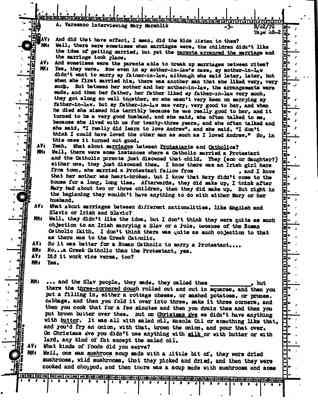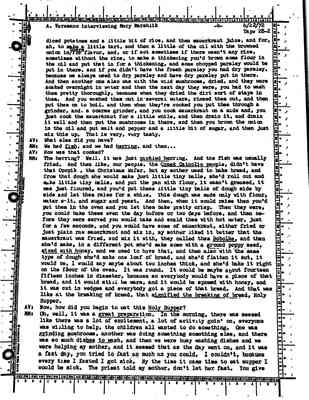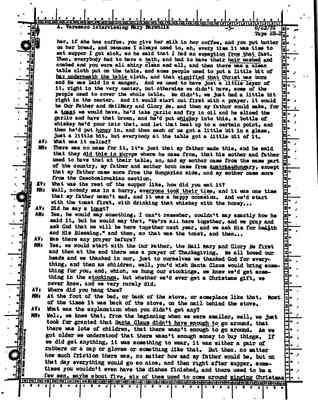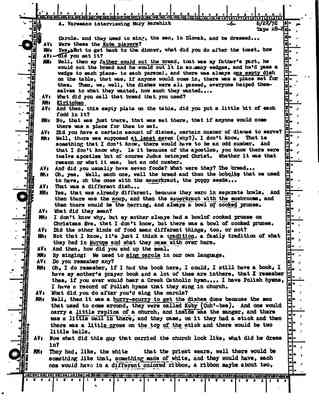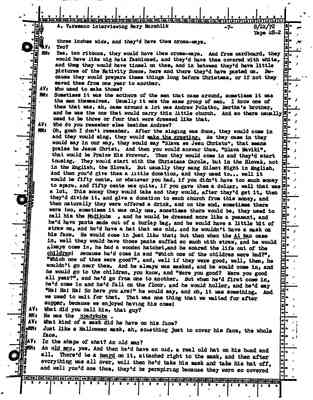Pages
35
A. Varesano interviewing Mary Marshlik -38/22/72 Tape 28-2
AV: And did that have effect, I mean, did the kids listen to them?
MM: Well, there were sometimes when marriages were, the children didn't like the idea of getting married, but yet the parents arranged the marriage [underline parents arranged the marriage] and the marriage took place.
AV: And sometimes were the parents able to break up marriages between rites?
MM: Yes, there were. Now even in my mother-in-law's case, my mother-in-law didn't want to marry my father-in-law, although she said later, later, but when she first married him, there was another man that she liked very, very much. But between her mother and her mother-in-law, the arrangements were made, and then her father, her father liked my father-in-law very much, they got along so well together, so she wasn't very keen on marrying my father-in-law, but my father-in-law was very, very good to her, and when he died she missed him terribly because he was really good to her, and it turned to be a very good husband, and she said, she often talked to me, because she lived with us for twenty-three years, and she often talked and she said, "I really did learn to love Andrew", and she said, "I don't think I could have loved the other man as much as I loved Andrew." So, in this case it turned out good.
AV: Yeah. What about marriages [underline marriages] between Protestants [underline Protestants] and Catholics [underline Catholics]?
MM: Well, there were some instances where a Catholic married a Protestant and the Catholic parents just disowned that child. They (son or daughter?) either one, they just disowned them. I know there was an Irish girl here from town, she married a Protestant fellow from [blank space], and I know that her mother was heart-broken, but I know that Mary didn't come to the house for a long, long time. Afterwards, they did make up. I think after Mary had about two or three children, then they did make up. But right in the beginning they wouldn't have anything to do with either Mary or her husband.
AV: What about marriages between different nationalities, like English and Slavic or Irish and Slavic?
MM: Well, they didn't like the idea, but I don't think they were quite as much objection to an Irish marrying a Slav or a Pole, because of the Roman Catholic faith. I don't think there was quite as much objection to that as there was to the Greek Catholic.
AV: So it was better for a Roman Catholic to marry a Protestant . . . .
MM: No . . . a Greek Catholic than the Protestant, yes.
AV: Did it work vice versa, too?
MM: Yes.
[At this point there is a larger gap after the MM: Yes. and then the remaining lines. The lines below do not follow the same Q & A topic as above.]
MM: . . . and the Slav people, they made, they called them [blank space represented by an underline], but there the three-cornered dough [underline three-cornered dough] rolled out and cut in squares, and then you put a filling in, either a cottage cheese, or mashed potatoes, or prunes, cabbage, and then you fold it over into three, make it three corners, and then you cook that for a few minutes and then you drain them and then you put brown butter over them. But on Christmas Eve [underline Christmas Eve] we didn't have anything with butter [underline butter]. It was all with salad oil, Mazola Oil or something like that, and you'd fry an onion, with that, brown the onion, and pour that over. On Christmas Eve you didn't use anything with milk [underline milk] or with butter or with lard, any kind of fat except the salad oil.
AV: What kinds of foods did you serve?
MM: Well, one was mushroom [underline mushroom] soup made with a little bit of, they were dried mushrooms, wild mushrooms, that they picked and dried, and then they were cooked and chopped, and then there was a soup made with mushrooms and some
36
A. Varesano interviewing Mary Marshlik -48/22/72 Tape 28-2
diced potatoes and a little bit of rice, and then sauerkraut juice, and for, ah, to make a litte tart, and then a little of the oil with the browned onion in there for flavor, and, or if not sometimes if there wasn't any rice, sometimes without rice, to make a thickening you'd brown some flour in the oil and put that in for a thickening, and some chopped parsley would be put in there, and if you didn't have the fresh parsley you had dry parsley, because we always used to dry parsley and have dry parsley put in there. And then another one also was with the wild mushrooms, dried, and they were soaked overnight in water and then the next day they were, you had to wash them pretty thoroughly, because when they dried the dirt sort of stays in them. And you washed them out in several waters, rinsed them out, and then put them on to boil, and then when they're cooked you put them through a grinder, and, a coarse grinder, and you cook sauerkraut on a side and, you just cook the sauerkraut for a little while, and then drain it, and drain it well and then put the mushrooms in there, and then you brown the onion in the oil and put salt and pepper and a little bit of sugar, and then just mix this up. That is very, very tasty.
AV: What else did you have?
MM: We had fish [underline fish], and we had herring [underline herring], and then . . .
AV: How was that cooked?
MM: The herring? Well, it was just pickled herring [underline pickled herring]. And the fish was usually fried. And then like, our people, the Greek Catholic people [underline Greek Catholic people], didn't have that Opopik , the Christmas Wafer, but my mother used to bake bread, and from that dough she would make just little tiny balls, she'd roll out and make little tiny balls, and put the pan with flour, it wasn't greased, it was just floured, and you'd but these little tiny balls of dough side by side and let them raise for a while. This dough was made only with flour, salt, and sugar and yeast. And then, when it would raise then you'd put them in the oven and you let them bake pretty crisp. Then they were, you could bake these even the day before or two days before, and then before they were served you would take and scald them with hot water, just for a few seconds, and you would have some of sauerkraut, either fried or just plain raw sauerkraut and mix in, my mother liked it better that the sauerkraut was fried, and mix it with, they called the Bobolke [underline Bobolke], and then she'd make, in a different pot she'd make some with ground poppy seed [underline ground poppy seed], mixed with honey [underline mixed with honey], and we used to have that, and then also with the same type of dough she'd make one loaf of bread, and she'd flatten it out, it would be, I would say maybe about two inches thick, and she'd bake it right on the floor of the oven. It was round. It would be maybe about fourteen fifteen inches in diameter, because so everybody would have a piece of that bread, and it would still be warm, and it would be spread with honey, and it was cut in wedges and everybody got a piece of that bread. And that was like at the breaking of bread, that signified the breaking of bread [underline signified the breaking of bread], Holy Supper.
AV: Now, how did you begin to eat this Holy Supper [underline Holy Supper]?
MM: Oh, well, it was a great preparation [underline great preparation]. In the morning, there was seemed like there was a lot of excitement, a lot of activity goin' on, everyone was willing to help, the children all wanted to do something. One was grinding mushrooms [underline grinding mushrooms], another was doing something else, and there was so much dishes to wash [underline dishes to wash], and then we were busy washing dishes and we were helping my mother, and it seemed that as the day went on, and it was a fast day, you tried to fast as much as you could. I couldn't because every time I fasted I got sick. By the time it came time to east supper I would be sick. The priest told my mother, don't let her fast. You give
37
A. Varesano interviewing Mary Marshlik -58/22/72 Tape 28-2
her, if she has coffee, you give her milk in her coffee, and you put butter on her bread, and because I always used to, ah, every time it was time to eat supper I got sick, so he said that I had an exemption from that fast [underline exemption from that fast]. Then, everybody had to have a bath [underline bath], and had to have their hair washed [underline hair washed] and combed and you were all shiny clean and all, and then there was a clean table cloth put on the table, and some people used to put a little bit of bay underneath the table [underline bay underneath the table] cloth, and that signified that Christ was [underline signified that Christ was] born and He was laid in a manger. And we used to have just a little layer of it, right in the very center, but otherwise we didn't have, some of the people used to cover the whole table. We didn't, we just had a little bit right in the center. And it would start out first with a prayer, it would be Our Father and Hail Mary and Glory Be, and then my father would make, for a toast [underline toast] we would have, he'd take garlic and fry in oil and he sliced the garlic and have that brown, and he'd put whiskey [underline whiskey] into this, a bottle of whiskey he'd pour into that, and let that heat up to a certain point, and then he'd put honey [underline honey] in, and then each of us got a little bit in a glass, just a little bit, but everybody at the table got a little bit of it.
AV: What was it called?
MM: There was no name for it, it's just that my father made this, and he said that they did this in Europe [underline did this in Europe] where he came from, that his mother and father used to have that at their table, so, and my mother came from the same part of the country, my father and mother both came from Austria-Hungary [underline Austria-Hungary], except that my father came more from the Hungarian side, and my mother came more from the Czechoslovakian section.
AV: What was the rest of the supper like, how did you eat it?
MM: Well, nobody was in a hurry, everyone took their time [underline everyone took their time], and it was one time that my father wasn't mad, and it was a happy occasion. And we'd start with the toast first, with drinking that whiskey with the honey . . .
AV: Did he say a toast [underline toast]?
MM: Yes, he would say something, I can't remember, couldn't say exactly how he said it, but he would say that, "We're all here together, and we pray and ask God that we will be here together next year, and we ask Him for health and His Blessing," and then, so that was the toast, and then . . .
AV: Was there any prayer before?
MM: Yes, we would start with the Our Father, the Hail Mary and Glory Be first and then at the end there was a prayer of Thanksgiving. We all bowed our heads and we thanked in our, just to ourselves we thanked God for everything, and then as children, well, you'd wish Santa Claus would bring something for you, and, which, we hung our stockings, we knew we'd get something in the stockings [underline stockings], but whether we'd ever get a Christmas gift, we never knew, and we very rarely did.
AV: Where did you hang them?
MM: At the foot of the bed, or back of the stove, or someplace like that. Most of the times it was back of the stove, on the nail behind the stove.
AV: What was the explanation when you didn't get any?
MM: Well, we knew that, from the beginning when we were smaller, well, we just took for granted that Santa Claus didn't have enough to [underline Santa Claus didn't have enough to] go around, that there was lots of children, that there wasn't enough to go around. As we got older we understood that there wasn't enough money to buy things. If we did get anything, it was something to wear, it was either a pair of rubbers or a cap or gloves or something like that. But then, not matter how much friction there was, no matter how mad my father would be, but on that day everything would go so nice, and then right after supper, sometimes you wouldn't even have the dishes finished, and there used to be a few men, maybe about five, six of them used to come around singing Christmas
38
A. Varesano interviewing Mary Marshlik -6- 8/22/72 Tape 28-2
Carols. and they used to sing, the men, in Slovak, and be dressed... AV: Were these the Kuba players? MM: Yes. But to get back to the dinner, what did you do after the toast, how AV: did you eat it? MM: Well, then my father would cut the bread, that was my father's part, he would cut the bread and he would cut it in so many wedges, and he'd pass a wedge to each piece - to each person! and there was always one empty dish on the table, that was, if anyone would come in, there was a place set for them. Then, we, well, the dishes were all passed, everyone helped themselves to what they wanted, how much the wanted... AV: What did you call the bread that you used? MM: Kiritchen. AV: And then, this empty plate on the table, did you put a little bit of each food in it? MM: No, that was just there, that was set there, that if anyone would come there was a place for them to eat. AV: Did you have a certain amout of dishes, certain number of dishes to serve? MM: Well, there was supposed at least seven (why?), I don't know. That is something that I don't know, there would have to be an odd number. And theat I don't know why. Is it because of the apostles, you know there were twelve apostles but of course Judas betrayed Christ. Whether it was that reason or what it was, but an odd number. AV: And did you usually have seven foods? What were they? The bread... MM: Oh, yes. Well, each one, well the bread and then the bobolke that we used to have, oh the ones with the sauerkraut, the poppy seeds... AV: That was a different dish... MM: Yes, that was slready different, because they were in seperate bowls. And then there was the soup, and then the sauerkraut with the mushrooms, and then there would be the herring, and always a bowl of cooked prunes. AV: What did they mean? MM: I don't know why, but my mother always had a bowl of cooked prunes on Christmas Eve, that I don't know, but there was always a bowl of cooked prunes. AV: Did the other kinds of food mean different things, too, or not? MM: Not that I know, it's just I think a tradition, a family tradition of what they had in Europe and what they came with over here. AV: And then, how did you end up the meal. MM: By singing! We used to sing carols in our own language. AV: Do you remember any? MM: Oh, I do remember, if I had the book here, I could, I still have a book, I have my mother's prayer book and a lot of them are inthere, that I remember them, if you ever would hear a Greek Catholic hymn...I have Polish hymns, I have a record of Polish hymns that they sing in church. AV: What did you do after you'd sing the carols? MM: Well, then it was a hurry-scurry to get the dishes done because the men that used to come around, they were called Kuby (Cuh'-bee). And one would carry a little replica of a church, and inside was the manger, and there was a little bell in there, and they came, on it they had a stick and then there was a little cross on the top of the stick and there would be two little bells. AV: Now what did this guy carry the church look like, what did he dress in? MM: They had, like, the white that the priest wears, well there would be something like that, something made of white, and they would have, each one would have in a different color ribbon, a ribbon maybe about two,
39
A. Varesano interviewing Mary Marshlik -7- 8/22/72 Tape 28-2
three inches wide, and they'd have them cross-ways. AV: Two? MM: Yes, two ribbons, they would hae them cross-ways. And from cardboard, they would have like big hats fashioned, and they'd have them covered with white, and then they would have tinsel on them, and in between they'd have little pictures of the Nativity Scene, here and there they'd have pasted on. Because they would prepare these things long before Christmas, or if not they saved them from one year to another. AV: Who used to make those? MM: Sometimes it was the mothers of hte men that came around, sometimes it was the men themselves. Usually it was the same group of men. I know one of them that was, ah, came around a lot was Andrew Polatko, Berth's brother, and he was the one that would carry this little church. And so there usually used to be three or four that were dressed like that. AV: Who do you remember else besides Andrew? MM: Oh, gosh I don't remember. After the singing was done, they would come in and they would sing they would make the greeting. As they came in they woudl say in our way, they would say "Slava es Jesu Christu", that means praise be Jesus Christ. And then you would answer them, "Slava Naviki", that would be Praise Him Forever. Then they would come in and they'd start tossing. They would start with the Christmas Carols, but in the Slovak, not in the English, the Slovak. But usually they sang Silent Night in English. And then you'd give them a little donation, and they used to...well it would be fifty cents, or whatever you had, if you didn't have too much monty to spare, and fifty cents was quite, if you gave them a dollar, well that was a lot. This money they would take and they would, after they'd get it, then they'd divide it, and give a donation to each church form this money, and then naturally they were offered a drink, and on the end, sometimes there were two, sometimes it was only one, sometimes there would be, they used to call him the Madikuba, and he would be dressed more like a peasant, and he'd have pants made our of a burlap bag, and he would have a little bit of straw on, and he'd have a hat that was old, and the wouldn't have a mask on his face. He would come in just like that; but then when the Al Man came in, well they would have those pants suffed so much with straw, and he woudl always come in, he had a wooden hatchet, and he scared the life out of the children! Because he'd come in and "Which one of the children were bad?", "Which one of the children were good?", and, well if they were good, well, then, he wouldn't go near them. And he always was masked, and he would come in, and he would go to the children, you know, and "Were you good? Were you good all year?", and he'd go from one to another. But when he'd first come in, he'd come in and he'd fall on the floor, and he would hollar, and he'd say "Ha! Ha! Ha! So here you are !" he would say, and oh, it was something. And we used to wait for that. That was one thing that we waited for after supper, because we enjoyed having him come! AV: What did you call him, that guy? MM: He was the Spadykuba. AV: What kind of a mask did he have on his face? MM: Just like a Halloween mask, ah, something just to cover his face, the whole face. AV: In the shape of what? An old man? MM: An old man, yes. And then he'd have an old, a real old hat on his head and all. There'd be a beard on it, attached right to the mask, and then after everything was all over, well then he'd take his mask and take his hat off, and well you'd see them, they'd be perspiring because they were so covered
